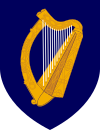Presidential Commission (Ireland)
This article needs additional citations for verification. (November 2013) |
 |
|---|
The Presidential Commission (Irish: Coimisiún na hUachtaránachta) is a body which performs the functions of the president of Ireland in the case of a vacancy or temporary absence.
Membership
[edit]Three members serve on the Presidential Commission.
| Office | Description | Incumbent |
|---|---|---|
| Chief Justice | President of the Supreme Court | Donal O'Donnell |
| Ceann Comhairle | Chairperson of Dáil Éireann | Verona Murphy |
| Cathaoirleach | Chairperson of Seanad Éireann | Jerry Buttimer |
The President of the High Court acts as a member in place of the Chief Justice if that office is vacant. The Leas-Cheann Comhairle acts as a member in place of the Ceann Comhairle if that office is vacant. The Leas-Chathaoirleach acts as a member in place of the Cathaoirleach if that office is vacant.[1] The Commission may act with at least two members.[2]
A proposal to abolish the Seanad, which was rejected at referendum in 2013, would have seen the Leas-Cheann Comhairle take the place of the Cathaoirleach on the Commission.[3][4]
Powers
[edit]The Presidential Commission fulfills all functions and duties of the office of President of Ireland when the office of President is vacant, or when the President is unavailable.
Vacancy may occur:
- on the death of the incumbent, as in 1974;
- on the resignation of the incumbent, as in 1976 and 1997;
- by impeachment of the incumbent, which has never happened.
- in the short interval between the conclusion of one president's term of office and the inauguration of a successor the next day — although the Presidential Commission has never been required to act in this time.
The Presidential Commission has often acted when the president is abroad, typically while making a state visit.[5] When the 22nd government of Ireland collapsed in November 1992, president Mary Robinson was abroad. The resignation of the Progressive Democrats ministers, the appointment by Taoiseach Albert Reynolds of caretaker Fianna Fáil replacement ministers, and Reynolds' request for a dissolution of the Dáil, were all effected by the Presidential Commission.[6][7] Temporary illness may also indispose the President. No President has ever refused to fulfil any of the duties of office.
Bills have occasionally been signed into law by the presidential commission while the president is out of the country; for example, the presidential commission signed the Marriage Act 2015 legislating for same-sex marriage as Michael D. Higgins was in the United States.[8]
Origins
[edit]The Presidential Commission was created in the 1937 Constitution of Ireland. It was first used between 29 December 1937, when the Constitution came into force, and 25 June 1938, when the first president was inaugurated. During this period, under the Transitory Provisions of the Constitution, the commission consisted of Chief Justice, the President of the High Court, and the Ceann Comhairle. Its composition differed from later commissions, as Seanad Éireann had not been constituted and elected.
Members of the Presidential Commission as acting President of Ireland
[edit]1937–1938
[edit]From the adoption of the Constitution of Ireland to the inauguration of Douglas Hyde.
| Name | Office | Period | |
|---|---|---|---|
| Timothy Sullivan | Chief Justice | 29 December 1937 | 25 June 1938 |
| Frank Fahy | Ceann Comhairle | ||
| Conor Maguire | President of the High Court | ||
1974
[edit]From the death of Erskine H. Childers to the inauguration of Cearbhall Ó Dálaigh.
| Name | Office | Period | |
|---|---|---|---|
| Tom O'Higgins | Chief Justice | 17 November 1974 | 19 December 1974 |
| Seán Treacy | Ceann Comhairle | ||
| James Dooge | Cathaoirleach | ||
1976
[edit]From the resignation of Cearbhall Ó Dálaigh to the inauguration of Patrick Hillery.
| Name | Office | Period | |
|---|---|---|---|
| Tom O'Higgins | Chief Justice | 22 October 1976 | 3 December 1976 |
| Seán Treacy | Ceann Comhairle | ||
| James Dooge | Cathaoirleach | ||
1997
[edit]From the resignation of Mary Robinson to the inauguration of Mary McAleese.
| Name | Office | Period | |
|---|---|---|---|
| Liam Hamilton | Chief Justice | 12 September 1997 | 11 November 1997 |
| Séamus Pattison | Ceann Comhairle | ||
| Liam T. Cosgrave | Cathaoirleach | 17 September 1997 | |
| Brian Mullooly | 17 September 1997 | 11 November 1997 | |
See also
[edit]- Council of State
- Lords Commissioners deputise at Westminster for the UK monarch
- Lord Justices (Ireland) deputised in Dublin when the Lord Lieutenant of Ireland was in Britain
References
[edit]- ^ Constitution of Ireland, Articles 14.2.2°, 14.2.3°, 14.2.4°.
- ^ Constitution of Ireland, Article 14.3.
- ^ "Thirty-second Amendment of the Constitution (Abolition of Seanad Éireann) Bill 2013 As passed by both Houses of the Oireachtas" (PDF). Oireachtas. 17 July 2013. p. 36 Schedule 3, Part 2, No.9. Archived (PDF) from the original on 19 January 2022. Retrieved 15 March 2024.
- ^ "Referendum on the Thirty-second Amendment of the Constitution (Abolition of Seanad Éireann) Bill 2013". Referendum Returning Officer. Archived from the original on 7 March 2024. Retrieved 15 March 2024.
- ^ "Presidential Commission". Citizens Information. Dublin: Citizens Information Board. 1 May 2008. Archived from the original on 26 July 2013. Retrieved 21 December 2010.
- ^ "Ministerial Changes: Statement – Dáil Éireann (26th Dáil)". Houses of the Oireachtas. 5 November 1992. Archived from the original on 10 August 2019. Retrieved 10 August 2019.
- ^ Clarity, James F. (6 November 1992). "Leader Defeated, Irish Government Collapses". The New York Times. Retrieved 21 December 2010.
- ^ "Bill allowing for same-sex marriage signed into law". The Irish Times. 29 October 2015. Archived from the original on 27 September 2018.
External links
[edit]- "Constitution of Ireland (Article 14)". Irish Statute Book. Archived from the original on 23 April 2022. Retrieved 3 March 2024.
